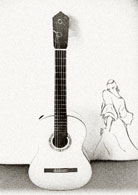Welcome to one of the most active flamenco sites on the Internet. Guests can read most posts but if you want to participate click here to register.
This site is dedicated to the memory of Paco de Lucía, Ron Mitchell, Guy Williams, Linda Elvira, Philip John Lee, Craig Eros, Ben Woods, David Serva and Tom Blackshear who went ahead of us.
We receive 12,200 visitors a month from 200 countries and 1.7 million page impressions a year. To advertise on this site please contact us.
|

|
|
RE: who needs other palos than bulerias?
|
You are logged in as Guest
|
|
Users viewing this topic: none
|
|
Login  | |
|

   
kozz
Posts: 1766
Joined: Feb. 26 2009
From: Eindhoven NL

|
 RE: who needs other palos than bulerias? (in reply to NormanKliman) RE: who needs other palos than bulerias? (in reply to NormanKliman)
|
|
|
quote:
ORIGINAL: NormanKliman
quote:
I have noticed in the case of music, the predictable and enjoyable rhythm or groove is often a gateway to the "zone" or "groove" and I consider it a key to unlock doors in the mind. Rhythmic challenged people don't feel it and experience nothing.
I agree completely. It seems that some people will never have rhythm, presumably because that part of their brain never gets activated. Maybe someone knows of some research on the subject.
This is you brain on music from Dr. Daniel J. Levetin.
I'll also have a few books from early 50's which were used at Philips Research when they tried to compose classical pieces in an electronic way. I've got to go diggin in the basement...
From This is your brain on music:
(...
We don’t usually talk about groove in the context of classical music, but most operas, symphonies, sonatas, concertos, and string quartets have a definable meter and pulse, which generally corresponds to the conductor’s movements; the conductor is showing the musicians where the beats are, sometimes stretching them out or compressing them for emotional communication.
Real conversations between people, real pleas of forgiveness, expressions of anger, courtship, storytelling, plan- ning, and parenting don’t occur at the precise clips of a machine. To the extent that music is reflecting the dynamics of our emotional lives, and our interpersonal interactions, it needs to swell and contract, to speed up and slow down, to pause and reflect. The only way that we can feel or know these timing variations is if a computational system in the brain has extracted information about when the beats are supposed to occur.
The brain needs to create a model of a constant pulse—a schema—so that we know when the musicians are deviating from it. This is similar to variations of a melody: We need to have a mental representation of what the melody is in order to know—and appreciate—when the musician is taking liberties with it.
Metrical extraction, knowing what the pulse is and when we expect it to occur, is a crucial part of musical emotion. Music communicates to us S emotionally through systematic violations of expectations. These viola- R tions can occur in any domain—the domain of pitch, timbre, contour, rhythm, tempo, and so on—but occur they must. Music is organized sound, but the organization has to involve some element of the unexpected or it is emotionally flat and robotic.
Too much organization may technically still be music, but it would be music that no one wants to listen to. Scales, for example, are organized, but most parents get sick of hearing their children play them after five minutes.
What of the neural basis for this metrical extraction? From lesion studies we know that rhythm and metrical extraction aren’t neurally re- lated to each other. Patients with damage to the left hemisphere can lose the ability to perceive and produce rhythm, but they can still extract me- ter, and patients with damage to the right hemisphere have shown the opposite pattern. Both of these are neurally separate from melody pro- cessing: Robert Zatorre found that lesions to the right temporal lobe af- fect the perception of melodies more than lesions to the left; Isabelle Peretz discovered that the right hemisphere of the brain contains a con- tour processor that in effect draws an outline of a melody and analyzes it for later recognition, and this is dissociable from rhythm and meter cir- cuits in the brain.
As we saw with memory, computer models can help us grasp the inner workings of the brain. Peter Desain and Henkjan Honing of the Nether- lands developed a computer model that could extract the beat from a piece of music. It relied mainly on amplitude, the fact that meter is de- fined by loud versus soft beats occurring at regular intervals of alterna- tion. To demonstrate the effectiveness of their system—and because they recognize the value of showmanship, even in science—they hooked up the output of their system to a small electric motor mounted inside a shoe. Their beat-extraction demonstration actually tapped its foot (or at least a shoe on a metal rod) to real pieces of music. I saw this demon- strated at CCRMA in the mid nineties. It was quite impressive. Spec- tators (I’m calling us that because the sight of men’s size-nine black wingtip shoe hanging from a metal rod and connected via a snake of wires to the computer was quite a spectacle) could give a CD to Desain and Honing, and their shoe would, after a few seconds of “listening,” start to tap against a piece of plywood. (When the demonstration was over, Perry Cook went up to them and said, “Very nice work . . . but does it come in brown?”)
Interestingly, the Desain and Honing system had some of the same weaknesses that real, live humans do: It would sometimes tap its foot in half time or double time, compared to where professional musicians felt that the beat was. Amateurs do this all the time. When a computerized model makes similar mistakes to a human, it is even better evidence that our program is replicating human thought, or at least the types of com- putational processes underlying thought.
The cerebellum is the part of the brain that is involved closely with timing and with coordinating movements of the body. The word cerebel- lum derives from the Latin for “little brain,” and in fact, it looks like a small brain hanging down underneath your cerebrum (the larger, main part of the brain), right at the back of your neck. The cerebellum has two sides, like the cerebrum, and each is divided into subregions. From phy- logenetic studies—studies of the brains of different animals up and down the genetic ladder—we’ve learned that the cerebellum is one of the oldest parts of the brain, evolutionarily speaking. In popular lan- guage, it has sometimes been referred to as the reptilian brain. Although it weighs only 10 percent as much as the rest of the brain, it contains 50 to 80 percent of the total number of neurons.
The function of this oldest part of the brain is something that is crucial to music: timing.
The cerebellum has traditionally been thought of as that part of the brain that guides movement. Most movements made by most animals have a repetitive, oscillatory quality. When we walk or run, we tend to do so at a more or less constant pace; our body settles into a gait and we maintain it. When fish swim or birds fly, they tend to flip their fins or flap their wings at a more or less constant rate. The cerebellum is involved in maintaining this rate, or gait. One of the hallmarks of Parkinson’s disease is difficulty walking, and we now know that cerebellar degeneration ac- companies this disease.
...)
|
|
|
|
REPORT THIS POST AS INAPPROPRIATE |
Date Nov. 19 2012 6:40:33
 |
|

  
XXX
Posts: 4400
Joined: Apr. 14 2005

|
 RE: who needs other palos than bulerias? (in reply to Ricardo) RE: who needs other palos than bulerias? (in reply to Ricardo)
|
|
|
quote:
But what happens is the knowledgeable artists in the room suddenly become aware and they get a fear or excitement, and the fear/excitement spreads and before you know it there is this tension in the room that almost everyone can feel and you can almost cut with a knife. Again, even though it's individual, the spreading of the thought feeling or "magic" if you will, I personally feel is part of this hypnosis thing...when your mind is closed it remains closed, but even if there are different types of "keys" for different people (emotions, memories, tastes, likes dislikes, biases, fetishes, nostalgia, drugs or alcohol, etc), when the doors open it is easy to feel a sort of "collective" experience happening. I have noticed in the case of music, the predictable and enjoyable rhythm or groove is often a gateway to the "zone" or "groove" and I consider it a key to unlock doors in the mind. Rhythmic challenged people don't feel it and experience nothing.
Correct me if im wrong, but again this seems to me an overcomplication of a simple thing. Music has two sides: lets call them composition and excecution. Assuming you enjoy WHAT you play (composition), you gain even more enjoyment when the group is tight and in groove (excecution). This is so simple and even people who have bad rhythm can feel when something works well in playing together and they will understand what i just wrote here because it is easy to grasp the way i break it down to a rational thing, and not something magical that is exclusive to a certain circle of people.
_____________________________
Фламенко
|
|
|
|
REPORT THIS POST AS INAPPROPRIATE |
Date Nov. 19 2012 8:29:17
 |
|

   
BarkellWH
Posts: 3460
Joined: Jul. 12 2009
From: Washington, DC

|
 RE: who needs other palos than bulerias? (in reply to XXX) RE: who needs other palos than bulerias? (in reply to XXX)
|
|
|
quote:
Magic" is (my) metaphor for something inexplainable. I dont deny the existence of hypnosis, i just dont think thats whats going on when playing guitar. At the least i dont think that hypnosis has anything to do with art, more with healthcare.
What some may mean by "hypnosis" while playing the guitar may be a metaphor as well. Just as you use the term "magic" as a metaphor for something unexplainable, others may use the term "hypnosis" to describe a certain state of being or feeling that may be termed "mesmerizing," as in, "The music was mesmerizing." In this case, they would not mean hypnosis in the literal sense of being hypnotized.
Cheers,
Bill
_____________________________
And the end of the fight is a tombstone white,
With the name of the late deceased,
And the epitaph drear, "A fool lies here,
Who tried to hustle the East."
--Rudyard Kipling
|
|
|
|
REPORT THIS POST AS INAPPROPRIATE |
Date Nov. 20 2012 10:42:53
 |
|
 New Messages New Messages |
 No New Messages No New Messages |
 Hot Topic w/ New Messages Hot Topic w/ New Messages |
 Hot Topic w/o New Messages Hot Topic w/o New Messages |
 Locked w/ New Messages Locked w/ New Messages |
 Locked w/o New Messages Locked w/o New Messages |
|
 Post New Thread
Post New Thread
 Reply to Message
Reply to Message
 Post New Poll
Post New Poll
 Submit Vote
Submit Vote
 Delete My Own Post
Delete My Own Post
 Delete My Own Thread
Delete My Own Thread
 Rate Posts
Rate Posts
|
|
|
Forum Software powered by ASP Playground Advanced Edition 2.0.5
Copyright © 2000 - 2003 ASPPlayground.NET |
0.078125 secs.
|


 Printable Version
Printable Version













 New Messages
New Messages No New Messages
No New Messages Hot Topic w/ New Messages
Hot Topic w/ New Messages Hot Topic w/o New Messages
Hot Topic w/o New Messages Locked w/ New Messages
Locked w/ New Messages Locked w/o New Messages
Locked w/o New Messages Post New Thread
Post New Thread